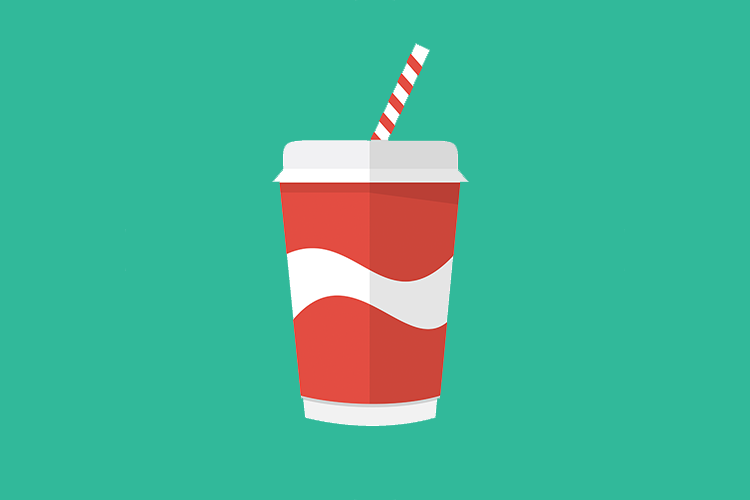Blog
Insulin resistance from a soft drink a day
If you were having any doubt about the sugary drink and increasing your risk for type 2 diabetes, this latest epidemiological study might be the straw to break the camel’s back.
Supporting a growing body of evidence, researchers from Tufts University have shown that as little as one can of a sugar-sweetened beverage (SSB) a day increases risk by 46%.1
To date, big soda has had considerable influence on research into the health impact of soft drink consumption, so no doubt outcomes like this won’t be pleasing to the ears of SSB industry!
As little as one can a day…
Researchers undertook an analysis of longitudinal dietary and lifestyle data from the Framingham Heart Study’s Offspring cohort.
They extrapolated cumulative SSB consumption of 1,685 middle-aged adults over a 14-year period. The participants did not have diabetes or pre-diabetes at baseline, and self-reported their SSB and diet soft drink intake. Such beverages included carbonated soft drinks like cola and fruit drinks, but not fruit juice.
When compared with those who consumed little or no sugary drinks, those drinking more than 3 serves, or on average 6x 350ml serves a week (1 can of Coke is 375ml), had significantly greater risk for prediabetes, despite confounding factors.
It could be assumed that an individual who drinks a daily soda may have an unhealthier diet and lifestyle overall – but even after adjusting for other aspects of diet and weight, the increased risk persisted. The high consumers had 8% higher insulin resistance scores at the 7-year follow-up, as measured by HOMA-IR.
Lead study author Jianto Ma follows states, “…our data are consistent with many other studies and clinical trials that support the health benefits of reducing sugar intake, and we encourage the public to look for healthier options.”
Correlation not causation
Sure, this study shows only a correlation, but the association is not new2-3 and provides evidence of the relationship between major indicators for prediabetes and too much sugary drink.
“Although our study cannot establish causality, our results suggest that high sugar-sweetened beverage intake increases the chances of developing early warning signs for type 2 diabetes. If lifestyle changes are not made, individuals with prediabetes are on the trajectory to developing diabetes,” said senior study author Nicola McKeown.
As with many health conditions, prevention is critical in type 2 diabetes, and can be more effective and powerful than treatment. Identifying risk factors early and making diet and lifestyle changes can reverse risks.
Some stuff on diabetes
As the incidence of type 2 diabetes rises, the importance of changing our habits around what we eat, drink and do is becoming increasingly important. With respect to that, here are a few things to consider:
- 275 adults over the age of 25 develop type 2 diabetes in Australia each year.4
- Every 6 seconds 1 person dies from diabetes around the globe – many of these type 2, and can often be prevented through changes to diet and lifestyle.5
- Doing little physical activity increases risk by 50% compared with those who move more than 150 minutes per week.
- Eating mostly real, whole foods over the heavily processed and packaged stuff may help reduce risk. Think loads of vegetables, with some quality protein and healthy fats, like that of a Mediterranean diet.
- Eating mostly low glycemic load foods, and lowering the intake of refined, heavily processed carbohydrates.
- Family history, overweight, having high blood pressure, high triglycerides and low HDL-C cholesterol, excessive alcohol intake and smoking are all associated risk factors.6
If you have concerns, please check in with your healthcare practitioner. They can run some blood tests and assess where you are at. And there are plenty of nutritionists, dieticians and other healthcare practitioners who can work with you and your individual situation to guide on toward a path of good health.
Insulin resistance, prediabetes or any other risk factors associated needn’t be the final word. What you choose to eat, drink and do can have wonderful, and significant, effects on your health and ameliorating the risk – in the short and long-term.
By Angela Johnson (BHSc Nut. Med.)
References:
- Ma et al. 2016, ‘Sugar-Sweetened Beverage but Not Diet Soda Consumption Is Positively Associated with Progression of Insulin Resistance and Prediabetes’, The Journal of Nutrition, vol. 146, pp. 1-7.
- Imamura, F, O’Connor, L, Ye, Z, Mursu, J, Hayashino, Y, Bhupathiraju, SN, & Forouhi, NG 2016, ‘Consumption of sugar sweetened beverages, artificially sweetened beverages, and fruit juice and incidence of type 2 diabetes: systematic review, meta-analysis, and estimation of population attributable fraction’, British Journal of Sports Medicine, no. 8, p. 496.
- Löfvenborg, JE, Andersson, T, Carlsson, P, Dorkhan, M, Groop, L, Martinell, M, Tuomi, T, Wolk, A, & Carlsson, S 2016, ‘Sweetened beverage intake and risk of latent autoimmune diabetes in adults (LADA) and type 2 diabetes’, European Journal of Endocrinology, vol. 175, no. 6, pp. 605-614.
- Baker IDI n.d., AusDiab – Key Findings, viewed 17 November 2016, <https://bakeridi.edu.au/impact/ausdiab/keyfindings>
- Diabetes Australia 2015, Diabetes Globally, viewed 17 November 2016, <https://www.diabetesaustralia.com.au/diabetes-globally>
- Diabetes Australia 2015, Pre-Diabetes, viewed 17 November 2016, <https://www.diabetesaustralia.com.au/pre-diabetes>












